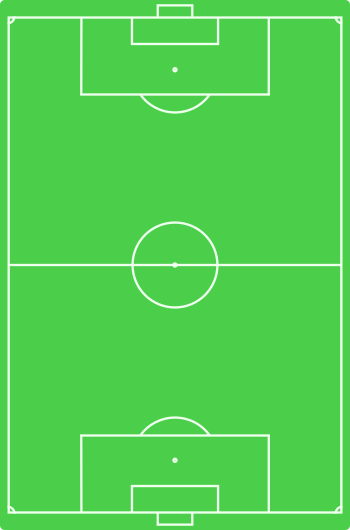FC Bihor Oradea
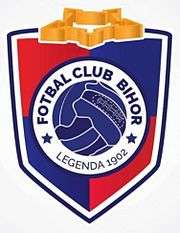 | |||
| Full name | Fotbal Club Bihor 1902 Oradea | ||
|---|---|---|---|
| Nickname(s) |
Roș-Albaștrii (The Red and Blues) Bihorenii (The People from Bihor County) Orădenii (The People from Oradea) Legendarii (The Legendary) | ||
| Short name | FC Bihor | ||
| Founded |
1958 as Crişul Oradea 2016 as FC Bihor 1902 Oradea | ||
| Ground | Episcopia | ||
| Capacity | 100 | ||
| Chairman | Mircea Fodor | ||
| Manager | George Zima | ||
| League | Liga V | ||
| 2015–16 | Liga II, Seria II, 13th (relegated) | ||
| Website | Club home page | ||
|
| |||
Fotbal Club Bihor Oradea (Romanian pronunciation: [biˈhor oˈrade̯a]) is a Romanian football club based in Oradea, founded in 1958 and refounded in 2016.
Chronology of names
| Name [1] | Period |
|---|---|
| Crişul Oradea | 1958–1961 |
| ASA Crişul Oradea | 1961–1972 |
| FC Bihor Oradea | 1972–2002 |
| FC Oradea | 2002–2005 |
| FC Bihor Oradea | 2005– |
History
FC Bihor Oradea continued the football tradition in Oradea after the dissolution of a much greater club, CA Oradea.
Early years
The club was founded under the name Crişul Oradea in 1958. It has a short activity in the city championship and then in the regional championship. In 1960 the team merged with the footwear factory "Solidarity" and, finishing first in the 1960–1961 regional championship, it promotes to the Divizia B after a play-off at Sinaia.
In 1961–1962 the team was renamed ASA Crişul, and finishes eleventh in the third series of the Divizia B, barely escaping relegation. The following season, 1962–1963, the club finished first in the series, and promoted for the very first time in history to the Divizia A. Coach L. Zilahi used the following players: Weichelt, Bucur, Pojoni, Boros, Şchiopu, Donciu, Al. Georgescu, Kun, Kuti, Curtu, Osan, Stanciu, Podaru, I. Pop, Bokos, I. Sandu, Manescu, Al. Iacob, Şovoială, Lenalt, Fr. Stilgerlbauer, R. Petschovschi.
Crişul played for three seasons in the first league: 1963–1964 (7th place), 1964–1965 (9th place) and 1965–1966 (13th place), then it relegated to the Divizia B where it played for two seasons, 1966–1967 (7th place) and 1967–1968 (2nd place). In the summer of 1968 it qualified for the play-off, in Timișoara, for the promotion to the Divizia A. There it manages to secure a place in the first league, coach A. Fernbach-Ferenczi, achieving this performance with the following players: Buiuc, Catona, Balogh, Sărac, Serfozo, E. Naghi, Popovici, Dărăban, Sudi, Szucs, Tomeş, A. Naghi, A. Kun II, I. Kun, I. Harsani, Cociş, Ujlaki, Levai.
After another two seasons in Divizia A, 1968–1969 (13th place) and 1969–1970 (15th place) it relegates, but returns the following season, 1970–1971, this time under the leadership of coach Ladislau Vlad. The core team: Catona (Bologan) – Popovici (Sărac), Lucaci, Bulc, Balogh, Dărăban, Neşu, Szucs, Al. Naghi, Arnotchi, Şchiopu. Substitutes: Baumgartner, Cocoş, Ceauşu, Cociş, Ungur, Moţ. But again, after only one championship 1971–1972, 16th place relegation to the Divizia B comes. The club's highly oscillating behavior imposed a series of organizational measures. It was organized as a football club, thus, new renamed Fotbal Club Bihor began in 1972 fighting for the return in the first league.
Golden Age of FC Bihor
It succeeds to do so (after two second places achieved in the championship editions 1972–1973 and 1973–1974) at the end of the 1974–1975 season. Coaches L. Vlad (first half of the championship), R. Cosmoc and Gh. Staicu (second half of the championship) have led to the final victory with the next "11": Albu – E. Naghi, Lucaci, Sărac, Popovici – Dărăban, A. Kun II, Florescu – Szucs, Aguda, C. Vlad.
Next, the team remained at an average level of behavior in the Divizia A, finishing 9th 1975–76 and 1976–1977, 14th 1977–1978 and 18th 1978–1979. The club management during this period, was provided by engineer Horea Cosma, as honorary president. Coaches: V. Blujdea, by mid-season 1977–1978, replaced by I. Reinhardt and Alex. Muta. Players used: Vidac, Albu – Z. Naghi, Gh. Dumitrescu, Lucaci, Popovici, M. Marian, Bigan, Dragoş, Naom, C. Georgescu, Ghergheli, Petrovici, Schwartzman, Lupău, V. Stoica, A. Kun II, Florescu şi Fildan.
In the summer of 1979 FC Bihor relegated back to Division B where it will be three editions of the championship (1979-1982), always on the brink of promotion, to be done by the end of 1981-1982 competition, this time under the leadership of Gheorghe Staicu.
Returned to the Divizia A the team managed to occupy 11th place in the 1982–83 and 7th place in the 1983–84, in this latter year with the following organizational formula: Honorary Chairman: H. Cosma; Executive President. Ioan Naom; Organizer of Competitions: Romeo Paşcu ; coaches: Gh. Dărăban and Attila Kun (in the first part of the season), Attila Kun and Alex. Muta (in the second part). Squad: Liliac, Balasz-Dianu, Zare, Gh. Dumitrescu, Niţu, Tămaş, Biszok, Mureşan, Filip, Doru Nicolae, Grosu, Georgescu, Ile, Ion Gheorghe, Szucs, Nedelcu, Rosza, Kiss, Lazăr, Roateş.
During 1983-1984, then until 1994, FC Bihor commuting between divisions A and B, but under the same name, the presence in the top of Divizia A is the end of 1989, when the team was ranked fourth, with great chances to accede in the European Cups. On December 22, 1989 radical changes were made, directing the football from Oradea to other coordinates. It came to collapse in 1996 due to a catastrophic management, which has left the club relegated to the third division with a fortune of two players, the rest being sold.
In July 1996 the Borsi brothers, businessmen from Oradea, took over the reins of the club and within a few months he was reinstated, managing the revival of the football from Bihor County back in the second division, and even touching the performance of qualification in the last 8 Romanian Cup teams.
In 1998, the club was taken over from the two brothers by another businessman, Viorel Ştiube, within 2 years the club knock on the doors of promotion to Divizia A but the objective was abandoned and the club reached the brink of relegation to the third division, than, it was taken over by Bihor County Council, finishing on a satisfactory position.
Promotion after 12 years
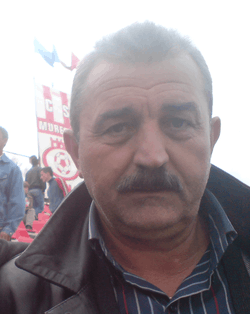
In the 2000–01 Divizia B season, the club was taken over by Marius Vizer, who started a project to bring in three years FC Bihor in the elite football. In his first season with Vizer as owner, FC Bihor finished fourth after a great return succeeded by the players and their coach Ioan Andone. In 2001–02 Divizia B team grabbed the last podium position after UTA Arad and FC Baia Mare and in 2002–03 Divizia B FC Bihor has made a step forward, being in the second position after Unirea Alba Iulia.
In those circumstances, Fotball Club Oradea (as it was called then), coached by Ionuț Popa and chaired by Ioan Lucian, qualify for the Divizia A play-off, a match against Oţelul Galaţi. After the first round, FC Bihor lost 1-2, in Galați, but they took the revenge on the Municipal Stadium with 20,000 fans in the stands, beating Oţelul Galaţi with 3-1, the "golden goal" was scored by Bogdan Vrăjitoarea in overtime. Besides, all four goals in the double confrontation with Oţelul were scored by Bogdan Vrăjitoarea.
The squad: Rotaru - Fl. Lazăr, Zaha, Cr. Munteanu - Gado, Naidin (Fele '63), Dumitra (captain), Fl. Călin ('67 Lungan) Sfârlea - Csehi, Vrăjitoarea. Substitutions: Mârne - Dianu, Măuță and Siminic. They could not play because of an injury, Coţan and Keșerü. The game against Oţelul accounted for FC Bihor supporters as the most important and beautiful game supported by FC Bihor at home in the post-revolutionary history.
It also was the last game in which the audience was allowed to access in the second stand. The game observer match was very close not to allow disputing the match in the stadium because the capacity was exceeded. The stadium announcer even made an appeal to supporters from the second stand to manifest without coming off the places which they occupy because there is a danger of collapse due to weight.
The adventure of FC Oradea in Divizia A was a short-lived one. After a hesitant first part of the season dotted with extraordinary results, like that 1-1 from the first round against Rapid București (the defending champions at that time), but also unexpected defeats as that against FC Brașov, in the last round of the first part. One of the artisans of the promotion, coach Ionuț Popa, was dismissed. It was the "beginning of the end". The club management, from which Marius Vizer withdrew, leaving the responsibility to the local government, they decided to put in office the former coach of Steaua București, Dumitru Dumitriu, a move which proved to be unfortunate. In the first game of the second part, FC Oradea not gathered too many points and Dumitriu was dismissed. By the end of the season, FC Oradea failed to obtain the points necessary to maintain in Divizia A and were relegated after only one year in the big football.
2006 Divizia A Promotion Play-Off
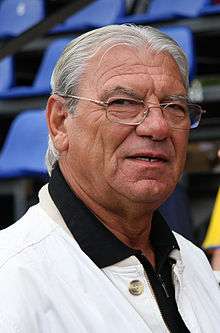
After the return to Divizia B, orădenii concluded the 2004–05 Divizia B season in third place after Jiul Petroșani and Gaz Metan Mediaș. In the next season, Bihor County had two teams in the top two places: Liberty Salonta, which gave its Divizia A place to UTA Arad and FC Bihor (President Alexandru Sătmăreanu, technical director Emerich Jenei, coach Alexandru Kiss) which disappointed at the promotion play-off, which was played on the National Stadium. In the first match FC Bihor lost 0-2 (0-1), against Forex Braşov and bowed in the last game, score 2-4 (1-4) against Unirea Urziceni, which promoted Unirea in the first league. The goals were scored for FC Bihor by Fl. Neaga and Foro. In that two games, for FC Bihor played: Mijanović - Oroş, Lupuţ, D. Muscă, Lungan - Foro, Gr. Tudor, Strapak, (Szélesi '66), Fl. Neaga - Voiculeț ('46 Lupașcu), Miculescu ('61 V. Grigore), with Forex Braşov, respectively: Mijanović - Oroş, Lupuţ ('36 Pătrașcu), D. Muscă, Lungan - Foro, Gr. Tudor, Strapak ('71 Voiculeț), Fl. Neaga - Miculescu ('46 V. Grigore), Szélesi. After the play-off, president and technical director Alexandru Sătmăreanu and Emerich Jenei were dismissed and FC Bihor has set itself as an objective to rebuild the team. President was named Alexandru Toth Ardelean and coaches in the 2006–07 Liga II season were Alexandru Kiss and Florin Farcaş. It was a very difficult championship, FC Bihor managed to save themselves from relegation in the last round after a win, 3-1, away to Auxerre Lugoj. Even if the seniors had problems, not the same can be said about Republican youth squad (coach Horia Rădulescu) and B youth squad (coach Gheorghe Silaghi) who managed to get the bronze medals in the final of the National Championship. Remarkable was that the second team, FC Bihor II (coach Mircea Fodor), managed to promote in Liga III, after a play-off match won, 3-2 against FC Zalău. In the 2007–08 Liga II season, FC Bihor started with a new technical staff composed of Gheorghe Silaghi (manager), Zoltan Vig (assistant manager), Mircea Fodor (assistant manager) and Dorin Mudura (goalkeeping coach). FC Bihor II was taken by Horia Rădulescu, who was helped by Alexandru Gergely. The club was financially supported by Oradea City Council and Bihor County Council.
A new beginning
At the end of the 2007–08 Liga II season FC Bihor has managed to stay away from the relegation places, occupying 8th place, with a record of 13 wins, 8 games ended in a draw, 13 defeats and 47 points away from the objective of the club, which had a squad consisting of valuable players and a budget that could allowed the promotion to the first league.
The squad of FC Bihor, prepared by Gheorghe Silaghi: Lipitor, Fildan, Bonta- V. Indrieş, Ambruş, Muscă, Lörincz, Opriceană, Teşan, A. Achim, Andor, Ayza, Floruţ, Lukacs, C. Bucur, Gongolea, S. Achim, Săndulescu, Mihu, Cosma, V. Florea, Predică, Radu, Szélesi, L. Todea.
On the same line of the modest progress, FC Bihor occupied 10th place, in the 2008–09 Liga II season, when he accumulated 46 points after winning 13 matches, 7 matches had ended in a draw and 14 defeats. Without significant changes in the group of players, but with a new coach in the person of Zoltan Vig and a budget of about 1 million. The management of FC Bihor was criticized for goal setting, a place from 1 to 10. At the end of the season bihorenii finished in 10th place.
The preparing of the next season was made under a new chairman, Gheorghe Alexandrescu, who held the job only from June 2009 to October 2009, after that the destinies of the red and blues were taken over by Ioan Lucian. FC Bihor has played in that edition of the championship equally disappointing, finally occupying 9th place with a line of 10 matches won, 12 matches ended in a draw, and 10 matches lost.
In the 2009–10 Liga II season the team was coached by Ioan Petcu, then replaced by Ovidiu Lazăr. In the second part of the season FC Bihor recovered with a new coach, Dan Dobai, and a squad with a lot of players from Liberty Salonta (Petrache, Tegzes, Chiş, Coroian, Sorian, Danci). In June 2010, between the local administration and businessman Marius Vizer, the chairman of the International Judo Federation and owner of Liberty Football Centre, was signed a two-year partnership on the takeover of the club management.
Premature promotion
With young players coming mostly from Liberty Salonta, FC Bihor managed in the first year of the collaboration with Liberty, a very good season in Liga II. Although officially the aim was not to promote, the club managed to be placed in second position in the 2010–11 Liga II season, and thus obtain the access to Liga I.
The performance was made possible after the team from Oradea has fared consistently in the championship, especially in the second part when though have some opponents who have announced from the start that aim to promote, teams like Voința Sibiu, CSMS Iaşi and Dacia Mioveni, FC Bihor managed to defeat them and conquer important points on their home ground.
From that "red-blue" squad were part players like: Adrian Mărkuș, Andrei Florean, Sergiu Oltean, Dumitru Muscă, Krisztián Pogacsics, Cătălin Chiş, Alexandru Sorian, Florin Pop and Mihai Deaconescu.
The first eleven that was sent on the pitch in the last game, a 4-2 win, against Gaz Metan CFR Craiova: Pogacsics - Oltean, Muscă, Deaconescu, Lupu - Chiş, M.Popa, Selagea - Florean, Cigan, Bîrză. In the second half they have entered: Sorian, Petrache and Fl. Pop, manager: Gheorghe Ghiţ.
Three of the four goals in that game from the last round of the championship were scored by Cătălin Chiş and the other one by Ciprian Selagea.
Joy of the promotion obtained on the football pitch, which was then celebrated in front of the Oradea City Hall by hundreds of fans and city and county officials, it was not a long-term one. A decision of the Romanian Football Federation, which has tightened the criteria for licensing, not made possible the evolution of FC Bihor in Liga I in the following season, because of the historic debts accumulated by the former management of the club.
It was a controversial decision of the Licensing Commission of the FRF, marking the first time when a team that have obtained the right to play in Liga I was relegated due to financial situation. Subsequently, after the economic crisis appeared, the licensing criteria have become milder.
Inconsistent results
However, "orădenii" were forced to start over again in Liga II next season. But although they have proposed to promote, they not have obtained it on the ground. The disappointment caused by the promotion ban was quite high and affected the morale of players who had an average age rather low .
Thus, FC Bihor finished the 2011–12 Liga II season ranked only 8th with 44 points, as a result of 12 wins, 8 draws and 10 defeats.
Meanwhile, partnership with businessman Marius Vizer and his company, Liberty, was extended, the objective of promoting was more pressing than ever. Unfortunately, although they were big ambitions, the first part of the 2012–13 Liga II season did not bring the expected results, the team was far from the objective. Coach Claudiu Niculescu was dismissed and Marian Pană was hired instead and five valuable players have signed contracts with FC Bihor: Florin Lazăr, Ciprian Vasilache, Ovidiu Mihalache, Cristian Bud and Daniel Vădrariu. In the second part of the season it has been tried an evolution with no mistake, a journey of force to return on the top places, but unfortunately, FC Bihor ranked only 7th with 33 points.
Partnership with Luceafărul
The disappointment caused by the failure of promotion, but also the fact that he was elected the president of SportAccord, determined businessman Marius Vizer not to extend the partnership with Oradea and Bihor County authorities.
After the separation of Liberty and supported only by the Oradea City Council and Bihor County Council, the club tried to rebuild the team, relying only on local players and young players from their own academy.
Later, during the reconstruction appeared the collaboration with Luceafărul Felix, the second team of Bihor County, which decided to withdraw from Liga II and give their best players to FC Bihor.
The team was rebuilt and Gheorghe Ghiţ, who managed the 2011 promotion, was appointed as the new coach.
In the first part of the season the results were poor and Gheorghe Ghiţ was replaced by Alexandru Pelici,[3] but results remained unchanged and FC Bihor ended in the 2013–14 Liga II season on 9th place, just above the relegation zone.
Financial issues
In the summer of 2014 Oradea City Council, one of the owners of the club, withdrew and left the team in a tough situation.[4] As a result of this action, the president Şerban Morcan refused to renew his contract with FC Bihor. In that time, the club was heading to dissolution. However, the other owner, Bihor County Council tried to reorganize the team and appointed a new chairman, in the person of Viorel Nemeş.[5]
However, the situation worsened after Bihor County Council faced legal problems related to the absence of the other owner from the club organization chart. The club lived entire season with money received from the transfers of players and sponsorships, but that money was not enough to pay the wages.[6] Because of the financial situation and the lack of results, coach Alexandru Pelici has resigned and was replaced by his assistant, Călin Cheregi.[7] In March 2015, president Viorel Nemeş has resigned due to the poor financial situation. Mircea Fodor, former player and coach of FC Bihor, was appointed as the new chairman, he was the only one who has assumed the disastrous situation.[8]
Then, in April, Călin Cheregi has resigned too and was replaced by Gheorghe Silaghi, former coach of FC Bihor II.[9]
The 2014–15 Liga II season was a real disaster for FC Bihor, which ended in the relegation zone, on 10th place, being saved only by the dissolution of FC Olt Slatina and Fortuna Poiana Câmpina.
In the summer of 2015, a new sponsor was brought to the club, in the person of Mihai Giurgiu, the owner of a football academy from Cluj-Napoca. He assumed all the club's debts estimated at one million euros, but after a short period he gave up to finance the team.[10]
In the 2015–16 Liga II season, the team was always threatened with bankruptcy and exclusion from championship and only the efforts made by Mircea Fodor and the players, who were not paid for several months, kept the team alive.[11] In October Gheorghe Silaghi has resigned and was replaced by Dan Mănăilă, the only coach who agreed to work for free. In January 2016, FC Bihor was kicked out from its headquarters and coach Dan Mănăilă chose to coach a Liga IV side instead of FC Bihor.[12]
Insolvency and bankruptcy
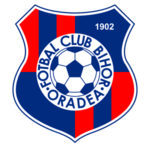
In 2009 the new chairman of FC Bihor, Ioan Lucian, discovered large debts and introduced the club into insolvency to avoid bankruptcy.[13] Then, during the partnership with Liberty the insolvency plan has been respected and 14 rates have been paid.[14]
After the withdrawal of Liberty, any rate has not been paid and the bankruptcy was delayed several times.[15] Then in October 2015, FC Bihor has been declared bankrupt, but the club contested the decision.[16]
Finally, after a year in which he lived from day to day, FC Bihor has been declared bankrupt on January 12, 2016.[17]
After the declaration of bankruptcy, CSM Oradea announced the establishment of the football department and took the youth academy of FC Bihor.[18]
Rebirth
After a spring in which they tried to build a team, CSM Oradea showed more interested in a partnership with newly promoted in Liga II club, Luceafărul Oradea by which the youth teams of CSM would play for Luceafărul.[19]
On 16 July 2016, the last president of FC Bihor and also a big fan of the team, Mircea Fodor, has announced that on 12 July 2016 FC Bihor reborn as FC Bihor 1902 Oradea and will be enroll in Liga IV or Liga V. He also announced that he will try to recover the record and the logo of FC Bihor.[20]
On 4 August 2016, Mircea Fodor announced that the team will be enroll in Liga V and the manager will be George Zima, a young manager.[21]
Youth academy
Youth academy of FC Bihor gave important names for Romanian and international football like: Sebastian Achim, Cosmin Bărcăuan, Zeno Bundea, Cristian Cigan, Ioan Filip, Ramses Gado, Ovidiu Hoban, Sebastian Ianc, Claudiu Keșerü, Attila Kun, Raymond Lukacs, Marius Popa, Daniel Usvat and Ion Zare. After the declaration of bankruptcy, CSM Oradea announced the establishment of the football department and took the youth academy of FC Bihor.
Stadium
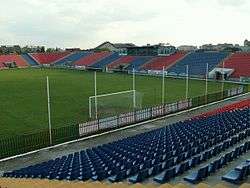
The club played its home matches on Stadionul Iuliu Bodola in Oradea. The second team and youth teams played their matches on Stadionul Motorul, also located in Oradea.
After the refoundation, from the summer of 2016, FC Bihor play its home matches on Stadionul Episcopia, a small stadium in the Episcopia Bihor neighbourhood.
Supporters
FC Bihor has many supporters in Oradea and especially in Bihor County. The ultras group of FC Bihor Oradea it is known as Peluza Nord Oradea (PNO).[22] FC Bihor supporters consider Olimpia Satu Mare supporters to be their allies, fans of both teams had the opportunity to support the other during matches.
Rivalries
The most important rivalry for FC Bihor is the one against UTA Arad.[23] This derby it is known as The West Derby, name used also for other two rivalries: UTA Arad Vs. Politehnica Timişoara and FC Bihor Oradea Vs. Politehnica Timişoara. Apart from these two rivalries, against UTA Arad and Politehnica Timişoara, FC Bihor have also a rivalry against FCM Baia Mare and a local one against Luceafărul Oradea, also known as Oradea Derby.[24]
Seasons
|
|
Current squad
- As of 19 November 2016
Note: Flags indicate national team as defined under FIFA eligibility rules. Players may hold more than one non-FIFA nationality.
|
|
Club officials
Board of directors
|
Current technical staff
|
Shirt sponsors and manufacturers
| Period | Kit manufacturer | Period | Shirt partner |
|---|---|---|---|
| 2003–2006 | |
2003–2006 | |
| 2006–2007 | |
2006–2007 | |
| 2007–2009 | |
2007–2009 | |
| 2009–2010 | |
2009–2011 | |
| 2010–2011 | | ||
| 2011–2016 | |
2011–2013 | |
| 2016– | |
Notable former players
The footballers enlisted below have had international cap(s) for their respective countries at junior and/or senior level.
|
|
Famous managers
|
Honours
Leagues
 Winners (5): 1962–63, 1970–71, 1974–75, 1981–82, 1987–88
Winners (5): 1962–63, 1970–71, 1974–75, 1981–82, 1987–88 Runners-up (8): 1967–68, 1972–73, 1973–74, 1979–80, 1992–93, 2002–03, 2005–06, 2010–11
Runners-up (8): 1967–68, 1972–73, 1973–74, 1979–80, 1992–93, 2002–03, 2005–06, 2010–11
 Winners (1): 1997–98
Winners (1): 1997–98
Other performances
- Appearances in Liga I: 18
- Best finish in Liga I: 7th place in 1963–1964, 1983–84 and 1988–89.
- Place 24 of 98 teams in Liga I All-time table
References
- ↑ http://www.romaniansoccer.ro/stiri/16668/evolutia-denumirilor-echipelor-de-a-lungul-anilor.htm
- ↑ http://www.fcbihor.ro/despre_noi/istoric
- ↑ http://www.bihon.ro/fc-bihor-a-parafat-contractul-cu-alexandru-pelici/1362913
- ↑ http://liga2.prosport.ro/seria-2/primaria-oradea-renunta-sa-finanteze-clubul-fc-bihor-condamnandu-l-la-faliment-12767716
- ↑ http://www.bihon.ro/fc-bihor-are-un-nou-presedinte-viorel-nemes/1438640
- ↑ http://www.digi24.ro/Stiri/Regional/Digi24+Oradea/Stiri/FOTBAL+FC+Bihor+in+asteptarea+primei+victorii+din+2015
- ↑ http://www.fcbihor.ro/stiri/1/fc-bihor-a-remizat-cu-fc-olt-iar-antrenorul-alexandru-pelici-i-a-anunat-demisia-864.html
- ↑ http://www.bihon.ro/mircea-fodor-este-noul-presedinte-la-fc-bihor/1515775
- ↑ http://www.fcbihor.ro/stiri/1/schimbari-pe-banca-tehnica-calin-cheregi-si-a-prezentat-demisia-gheorghe-silaghi-este-noul-antrenor-958.html
- ↑ http://www.bihon.ro/mihai-giurgiu-presedinte-la-fc-bihor/1563892
- ↑ http://www.digi24.ro/Stiri/Regional/Digi24+Oradea/Stiri/FOTBAL+Strigatul+disperarii+la+FC+Bihor+Mircea+Fodor+Ce+sa+mai+f
- ↑ http://liga2.prosport.ro/seria-2/fc-bihor-a-ramas-fara-antrenor-si-sediu-ziua-de-12-ianuarie-e-asteptata-cu-teama-are-loc-recursul-facut-dupa-declararea-falimentului-14959567
- ↑ http://www.mediafax.ro/sport/clubul-fc-bihor-a-intrat-in-insolventa-5084365
- ↑ http://www.digi24.ro/Stiri/Regional/Digi24+Oradea/Stiri/FC+Bihor+punct+final
- ↑ http://www.digi24.ro/Stiri/Regional/Digi24+Oradea/Stiri/FC+Bihor+traieste+Tribunalul+Bihor+a+amanat+pe+29+septembrie+lua
- ↑ http://www.bihon.ro/fc-bihor-intra-in-faliment-2/1579075
- ↑ http://liga2.prosport.ro/seria-2/adio-fc-bihor-clubul-oradean-a-intrat-oficial-in-faliment-si-nu-mai-poate-sa-si-continue-activitatea-decizia-e-irevocabila-14963654
- ↑ http://www.ebihoreanul.ro/stiri/ultima-or-31-1-2/csm-oradea-a-preluat-grupele-de-copii-ale-fc-bihor-si-vrea-sa-cumpere-brandul-clubului-125138.html
- ↑ http://www.digi24.ro/Stiri/Regional/Digi24+Oradea/Stiri/FOTBAL+Negocieri+intre+CSM+Oradea+si+Luceafarul
- ↑ http://www.bihon.ro/s-a-nascut-noul-fc-bihor/1664163
- ↑ http://www.jurnalbihorean.ro/sport/2016/08/03/fc-bihor-legenda1902-se-inscrie-in-liga-5.bihorean#registered
- ↑ http://www.ultras-world.com/Forum/ultras/219-ultras-group-names-names-of-ultras
- ↑ http://www.crisana.ro/stiri/sport-2/fc-bihor-uta-batrana-doamna-derby-ul-vestului-de-alta-data-151608.html
- ↑ http://www.bihon.ro/fc-bihor-a-castigat-derby-ul-cu-luceafarul-felix-scor-2-1/1182507

